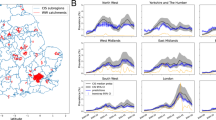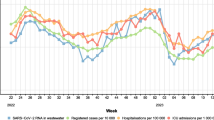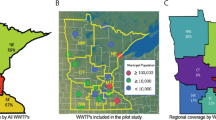Abstract
Wastewater-based epidemiology (WBE) programs are cost-effective for continuously monitoring infections, including SARS-CoV-2. This work proposes combining data analysis and machine learning to track and monitor SARS-CoV-2 in wastewater treatment plants. Our approach includes exploratory data analysis and data regression using support vector machine regression (SVM) models fitted with the collected data by New York City (NYC). SVM regression models show a coefficient of correlation R2 between 0.93 and 0.99 compared with linear regression models reporting values within 0.70–0.88. Moreover, we propose the estimation of the optimal sample size using Monte Carlo analysis and the corresponding operational cost reduction of the existing NYC program as a result of this optimization, estimated as 170,000 USD per year (~ 40% decrease). Our approach can be used to optimize existing and new WBE programs. Thus, we run a quick economic exercise for a case study in the Global South to provide a clear picture of the capital expenditure (CAPEX) and operational expenditure (OPEX) breakdown structure for implementing these programs.









Similar content being viewed by others
Data availability
Data will be made available on request.
References
Anneser E, Riseberg E, Brooks YM, Corlin L, Stringer C (2022) Modeling the relationship between SARS-COV-2 RNA in wastewater or sludge and covid-19 cases in three New England regions. J Water Health 20(5):816–828. https://doi.org/10.2166/wh.2022.013
Been F, Bastiaensen M, Lai FY, Libousi K, Thomaidis NS, Benaglia L, Esseiva P, Delémont O, van Nuijs AL, Covaci A (2018) Mining the chemical information on urban wastewater: monitoring human exposure to phosphorus flame retardants and plasticizers. Environ Sci Technol 52(12):6996–7005. https://doi.org/10.1021/acs.est.8b01279
Bijlsma L, Picó Y, Andreu V, Celma A, Estévez-Danta A, González-Mariño I, Hernández F, López de Alda M, López-García E, Marcé RM, Miró M, Montes R, de San P, Román-Landa U, Pitarch E, Pocurull E, Postigo C, Prieto A, Rico A, Rodil R, Valcárcel Y, Ventura M, Quintana JB (2021) The embodiment of wastewater data for the estimation of illicit drug consumption in Spain. Sci Total Environ 772:144794. https://doi.org/10.1016/j.scitotenv.2020.144794
Centers for Disease Control and Prevention (2023) National Wastewater Surveillance System (NWSS). Centers for Disease Control and Prevention. Retrieved April 2, 2023, from https://www.cdc.gov/nwss/wastewater-surveillance.html
Cheng L, Dhiyebi HA, Varia M, Atanas K, Srikanthan N, Hayat S, Ikert H, Fuzzen M, Sing-Judge C, Badlani Y, Zeeb E, Bragg LM, Delatolla R, Giesy JP, Gilliland E, Servos MR (2023) Omicron COVID-19 case estimates based on previous SARS-CoV-2 wastewater load, regional municipality of peel, Ontario, Canada. Emerg Infectious Dis 29(8):1580–1588. https://doi.org/10.3201/eid2908.221580
Coronavirus response: Monitoring of wastewater contributes to tracking coronavirus and variants across all EU countries. Environment. (2022). Retrieved April 2, 2023, from https://environment.ec.europa.eu/news/coronavirus-response-monitoring-wastewater-contributes-tracking-coronavirus-and-variants-across-all-2022-03-17_en
Corpoelec, La Energía del pueblo a SU servicio!!! Retrieved April 2, 2023, from http://www.corpoelec.gob.ve/sites/default/files/Oficinas/Tarifas.php
Covid-19 wastewater testing—DEP. Retrieved April 2, 2023, from https://www.nyc.gov/site/dep/whats-new/covid-19-wastewater-testing.page
Duan L, Zhang Y, Wang B, Yu G, Gao J, Cagnetta G, Huang C, Zhai N (2022) Wastewater surveillance for 168 pharmaceuticals and metabolites in a WWTP: occurrence, temporal variations and feasibility of metabolic biomarkers for intake estimation. Water Res 216:118321. https://doi.org/10.1016/j.watres.2022.118321
Faraway J, Boxall-Clasby J, Feil EJ, Gibbon MJ, Hatfield O, Kasprzyk-Hordern B, Smith T (2022) Challenges in realising the potential of wastewater-based epidemiology to quantitatively monitor and predict the spread of disease. J Water Health 20(7):1038–1050. https://doi.org/10.2166/wh.2022.020
Gil-Solsona R, Nika M-C, Bustamante M, Villanueva CM, Foraster M, Cosin-Tomás M, Alygizakis N, Gómez-Roig MD, Llurba-Olive E, Sunyer J, Thomaidis NS, Dadvand P, Gago-Ferrero P (2021) The potential of sewage sludge to predict and evaluate the human chemical exposome. Environ Sci Technol Lett 8(12):1077–1084. https://doi.org/10.1021/acs.estlett.1c00848
Hahn RZ, Augusto do Nascimento C, Linden R (2021) Evaluation of illicit drug consumption by wastewater analysis using polar organic chemical Integrative Sampler as a monitoring tool. Front Chem, 9. https://doi.org/10.3389/fchem.2021.596875
Kilaru P, Hill D, Anderson K, Collins MB, Green H, Kmush BL, Larsen DA (2021) Wastewater surveillance for infectious disease: A systematic review. medRxiv. Retrieved April 2, 2023, from https://doi.org/10.1101/2021.07.26.21261155v1.full
Krivoňáková N, Šoltýsová A, Tamáš M, Takáč Z, Krahulec J, Ficek A, Gál M, Gall M, Fehér M, Krivjanská A, Horáková I, Belišová N, Bímová P, Škulcová AB, Mackuľak T (2021) Mathematical modeling based on RT-qPCR analysis of SARS-COV-2 in wastewater as a tool for epidemiology. Sci Reports 11(1). https://doi.org/10.1038/s41598-021-98653-x
Li X, Zhang S, Sherchan S, Orive G, Lertxundi U, Haramoto E, Honda R, Kumar M, Arora S, Kitajima M, Jiang G (2023) Correlation between SARS-COV-2 RNA concentration in wastewater and COVID-19 cases in community: a systematic review and meta-analysis. J Hazard Mater 441:129848. https://doi.org/10.1016/j.jhazmat.2022.129848
Li G, Denise H, Diggle P, Grimsley J, Holmes C, James D, Jersakova R, Mole C, Nicholson G, Smith CR, Richardson S, Rowe W, Rowlingson B, Torabi F, Wade MJ, Blangiardo M (2022) A spatio-temporal framework for modelling wastewater concentration during the COVID-19 pandemic. https://doi.org/10.1101/2022.10.14.22281081
Manoj K (2020) Wastewater monitoring and public health surveillance of SARS-COV-2. Indian J Public Health 64(6):247. https://doi.org/10.4103/ijph.ijph_490_20
McMahan CS, Self S, Rennert L, Kalbaugh C, Kriebel D, Graves D, Colby C, Deaver JA, Popat SC, Karanfil T, Freedman DL (2021) Covid-19 wastewater epidemiology: A model to estimate infected populations. Lancet Planet Health 5(12). https://doi.org/10.1016/s2542-5196(21)00230-8
Nourbakhsh S, Fazil A, Li M, Mangat CS, Peterson SW, Daigle J, Langner S, Shurgold J, D’Aoust P, Delatolla R, Mercier E, Pang X, Lee BE, Stuart R, Wijayasri S, Champredon D (2021) A wastewater-based epidemic model for SARS-COV-2 with application to three Canadian cities. https://doi.org/10.1101/2021.07.19.21260773
O’Keeffe J (2021) Wastewater-based epidemiology: current uses and future opportunities as a public health surveillance tool. Environ Health Rev 64(3):44–52. https://doi.org/10.5864/d2021-015
Noticias Recientes. Hidrolara. Retrieved April 2, 2023, from https://hidrolara.lara.gob.ve/
Schill R, Nelson KL, Harris-Lovett S, Kantor RS (2023) The dynamic relationship between COVID-19 cases and SARS-COV-2 wastewater concentrations across time and space: considerations for model training data sets. Sci Total Environ 871:162069. https://doi.org/10.1016/j.scitotenv.2023.162069
Shipingana LN, Shivaraju HP, Yashas SR (2022) Quantitative assessment of pharmaceutical drugs in a municipal wastewater and overview of associated risks. Appl Water Sci 12(2). https://doi.org/10.1007/s13201-022-01570-1
Sims N, Kasprzyk-Hordern B (2020) Future perspectives of wastewater-based epidemiology: monitoring infectious disease spread and resistance to the community level. Environ Int 139:105689. https://doi.org/10.1016/j.envint.2020.105689
Sustainable rate structure analysis - New York City. Retrieved April 2, 2023, from https://www.nyc.gov/assets/dep/downloads/pdf/whats-new/programs-initiatives/srsa-faq.pdf
UNUniversity. Needed in the Global South: Wastewater collection for covid-19 detection. Our World. Retrieved April 2, 2023, from https://ourworld.unu.edu/en/needed-in-the-global-south-wastewater-collection-for-covid-19-detection
Yang S, Rothman RE (2004) PCR-based diagnostics for infectious diseases: uses, limitations, and future applications in acute-care settings. Lancet Infect Dis 4(6):337–348. https://doi.org/10.1016/s1473-3099(04)01044-8
Author information
Authors and Affiliations
Corresponding author
Ethics declarations
Conflict of interest
All authors have participated in (a) conception and design, or analysis and interpretation of the data; (b) drafting the article or revisiting it critically for impact intellectual content; and (c) approval of the final version. This manuscript has not been submitted to, nor is under review at, another journal or other publishing venue. The authors have no affiliation with any organization with a direct or indirect financial interest in the subject matter discussed in the manuscript. The authors declare that they have no known competing financial interests or personal relationships that could have appeared to influence the work reported in this paper.
Additional information
Editorial responsibility: Samareh Mirkia.
Rights and permissions
Springer Nature or its licensor (e.g. a society or other partner) holds exclusive rights to this article under a publishing agreement with the author(s) or other rightsholder(s); author self-archiving of the accepted manuscript version of this article is solely governed by the terms of such publishing agreement and applicable law.
About this article
Cite this article
Mendoza, D., Perozo, M., Garaboto, M.A. et al. An integrated data analysis and machine learning approach to track and monitor SARS-CoV-2 in wastewater treatment plants. Int. J. Environ. Sci. Technol. 21, 4727–4738 (2024). https://doi.org/10.1007/s13762-023-05310-z
Received:
Revised:
Accepted:
Published:
Issue Date:
DOI: https://doi.org/10.1007/s13762-023-05310-z




